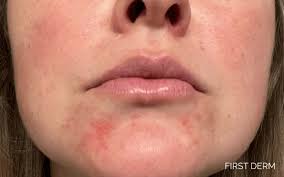
Dry Skin Around the Mouth: Causes, Prevention, and Effective Treatments
Dry skin is something most people will experience at some point in their lives.
It can appear on any part of the body or face, but dry skin around the mouth presents a unique set of challenges.
This area of the face is highly visible, delicate, and constantly moving.
Every time you talk, eat, smile, or even breathe, the skin around your mouth is in motion.
Because of this constant movement, dryness around the mouth can be uncomfortable, frustrating, and persistent.
You may notice the skin feeling tight, flaky, or even irritated.
In some cases, it can burn or itch, which can be incredibly annoying.
Aside from being physically uncomfortable, dry skin around the mouth can affect self-esteem and confidence.
If you’re dealing with dry skin in this area, you’re not alone, and there are effective ways to manage it.
To help shed light on the causes and solutions, we consulted dermatologists Dr. Nava Greenfield and Dr. Debra Jaliman.
In this guide, we’ll dive into the most common causes of dry skin around the mouth, prevention strategies, and the best treatments available.
Why Is the Skin Around Your Mouth Prone to Dryness?
The skin around your mouth is naturally different from the rest of your face.
Although it’s structurally similar, it has fewer sebaceous glands, which are responsible for producing natural oils.
According to Dr. Jaliman, the lack of these oil glands means that the skin around the mouth doesn’t have the same protective barrier against moisture loss.
This makes it more prone to dryness, irritation, and sensitivity, especially when exposed to environmental stressors.
Let’s look at some of the most common causes of dry skin in this area.
Common Causes of Dry Skin Around the Mouth
1. Environmental Factors
Environmental conditions are a major contributor to dry skin around the mouth.
Some key environmental triggers include:
Cold Weather: Winter air is typically dry, and indoor heating systems make it even worse. Just like your lips, the skin around your mouth can become chapped during the colder months.
Wind Exposure: Wind can strip moisture from your skin’s surface, leading to redness, chapping, and peeling.
Sun Exposure: The skin around your mouth gets a lot of sun exposure, but many people neglect to apply SPF to this area. Over time, the sun damages the skin’s natural moisture barrier, leading to dryness.
Low Humidity Environments: If you live in a dry climate or spend a lot of time in air-conditioned or heated spaces, your skin may constantly crave hydration.
2. Irritating Skincare or Dental Products
Sometimes, the products you use daily might be contributing to dryness around the mouth.
Some of the most common offenders are:
Toothpaste & Mouthwash: Dr. Jaliman points out that certain toothpaste ingredients—like cinnamon flavor or strong mint oils—can irritate the skin.
Sodium lauryl sulfate, a common foaming agent, can also dry out the skin.
Flavored Lip Products: Lip balms or glosses with added fragrance or flavor might seem nice, but they can trigger irritation, especially if you tend to lick your lips frequently.
Fragranced Skincare Products: Skin care products with fragrances—whether they’re cleansers, creams, or lip balms—can increase the risk of dryness and irritation, particularly for sensitive skin.
3. Habits That Exacerbate Dryness
Certain daily habits can make dryness around the mouth worse.
These seemingly innocent behaviors can actually contribute to more severe dryness:
Lip Licking: Licking your lips might seem like a natural response to dry skin, but saliva contains enzymes meant to break down food, not hydrate your skin.
When the saliva evaporates, it takes away moisture from your skin.
Frequent Wiping or Touching: Constantly wiping your mouth—whether from eating, drinking, or wearing a mask—can disrupt the skin barrier, leading to dryness and irritation.
Mouth Breathing: Breathing through your mouth, whether due to nasal congestion or habit, can dry out the skin around your lips over time.
4. Skin Conditions
A variety of skin conditions can cause chronic or recurring dryness around the mouth.
Some common conditions include:
Angular Cheilitis: This condition affects the corners of the mouth and is usually triggered by fungal or bacterial overgrowth. It can cause redness, cracking, and discomfort.
Eczema (Atopic Dermatitis): Eczema can appear anywhere on the body, including around the mouth. It typically presents as red, itchy, dry patches, which may flare up due to allergens or weather changes.
Perioral Dermatitis: A more severe condition, perioral dermatitis causes a red, bumpy rash around the mouth. It’s often triggered by the overuse of topical steroids or irritating skincare products.
Psoriasis: While less common around the mouth, psoriasis can still lead to dry, scaly patches in this area.
How to Prevent Dry Skin Around the Mouth
Prevention is often the best approach when it comes to skincare.
Here are dermatologist-approved tips for preventing dry skin around the mouth:
1. Simplify Your Routine
Stick to gentle, fragrance-free products, especially around your lips and mouth.
Look for products with soothing, barrier-repairing ingredients such as:
Ceramides, Hyaluronic Acid, Glycerin, Squalane
Avoid using harsh ingredients like retinoids, AHAs, BHAs, or sulfates in this area unless advised by a dermatologist, as they can strip moisture and cause irritation.
2. Use Lip Products Without Flavors or Fragrance
Flavored lip balms or glosses might encourage you to lick your lips more often, worsening dryness.
Instead, opt for fragrance-free, hypoallergenic lip products, ideally with SPF to protect your skin from the sun.
3. Switch to Dental Products for Sensitive Gums
Dr. Jaliman recommends using toothpaste and mouthwash designed for sensitive users.
These products tend to be free of harsh detergents and irritating ingredients, making them gentler on the skin around your mouth.
4. Cover Your Face in Harsh Weather
When the weather is harsh, use a scarf or face mask to protect your skin.
This barrier can help shield your skin from wind and cold, preventing moisture loss and protecting against environmental aggressors.
How to Treat Dry Skin Around the Mouth
If you’re already experiencing dry, flaky skin around your mouth, don’t worry—there are plenty of ways to restore hydration and comfort.
1. Apply a Barrier Cream or Healing Ointment
After cleansing, apply a thick layer of barrier repair cream or an occlusive ointment (such as petroleum jelly or lanolin-based balm).
These products seal in moisture and support the skin’s natural healing process.
Great ingredients to look for include:
Ceramides (help rebuild the skin’s barrier)
Hyaluronic Acid (draws water into the skin)
Panthenol (Vitamin B5) (soothes irritation and aids in healing)
2. Use a Gentle, Hydrating Cleanser
Avoid foaming or exfoliating cleansers, as they can strip natural oils from your skin.
Instead, use a creamy, non-foaming, sulfate-free cleanser that hydrates the skin without causing irritation.
3. Add a Humidifier to Your Room
Using a humidifier, especially during winter or in dry climates, can help retain moisture in the air and prevent your skin from drying out overnight.
It’s a simple but highly effective way to keep your skin hydrated.
4. Avoid Harsh Treatments in This Area
If you’re using active treatments like exfoliating acids or retinoids, apply them carefully around the mouth or avoid the area altogether if you’re prone to dryness.
When to See a Dermatologist
Although most cases of dry skin around the mouth can be treated at home, there are instances when you should seek professional help.
You should consult a board-certified dermatologist if you experience:
Painful cracking, Persistent redness or swelling, Rashes or bumps, Bleeding, Oozing or signs of infection
These could be signs of more serious conditions like perioral dermatitis or angular cheilitis, which may require prescription treatment.
The Bottom Line
Dry skin around the mouth is a common issue that many people face.
It can be caused by a variety of factors, including environmental conditions, skincare products, and certain skin conditions.
Although it may feel frustrating at times, there are plenty of ways to treat and prevent this dryness.
The most important thing is to be gentle with your skin, avoid irritating products, and nourish it with hydrating and healing ingredients.
By making small changes in your skincare routine and daily habits, you can restore moisture and protect your skin, ensuring it stays healthy, smooth, and comfortable year-round.


